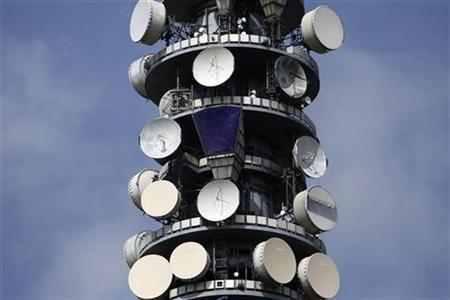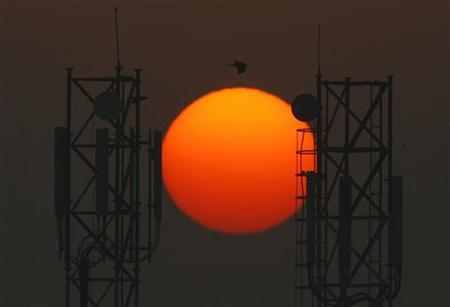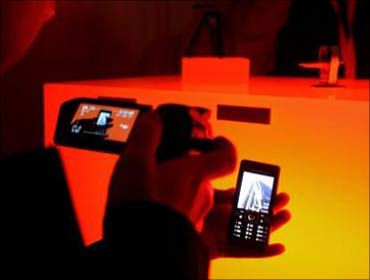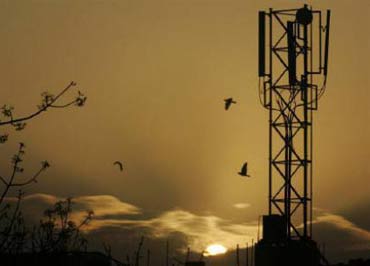Photographs: Courtesy, Sony Shishir Asthana in Mumbai
A primer on the ongoing spectrum auction, its process and how it would impact the companies.
One more round of spectrum auction has brought the telecom sector back in news. Telecom sector stocks have been volatile as competitive bids have raised the spectrum auction prices.
The sector creates a sense of awe on account of technical jargons surrounding it.
The entire auction process throws up an image of a Bollywood movie where business men and women are trying to outbid each other.
Nothing could be further from the truth.
Here is an attempt to demystify the sector, understand what is spectrum, why and how are they being auctioned and how would it impact the companies who are the winners and what does it mean to the losers.
...
What is spectrum auction all about?
First let’s understand what is being sold -- Spectrum.
We were first introduced to spectrum in school when we saw that seven colours were produced when a white light hits a glass prism.
In simple terms, spectrum can be considered as a range of all lights of various wavelengths.
But light is part of a larger spectrum called the electromagnetic (EM) spectrum. EM spectrum has in it a range of similar EM radiations like visible light, infrared light, ultraviolet light, X-rays and the one that is useful to us here is radio waves. As these are all radiations, they travel and spread as they go.
Waves are defined by attributes of wavelength (length of the wave), amplitude (height of the wave) and frequency (number of cycles per seconds).
Radio waves are those that have frequency of 3 kHz (3000 cycle per second) to 300 GHz (3 billion cycles per second). Audible frequency for human is between 20 Hz to 20,000 Hz.
...
What is spectrum auction all about?
Photographs: Reuters
Consider waves moving around us at different speeds (frequencies) between 3 kHz and 300 GHz. Different frequencies are utilised for different purposes.
The Radio FM stations air their channels around the 100 MHz frequencies. Out of these, government of India has selected two -- 900 MHz and 1800 MHz to be auctioned to telecom companies.
Higher frequencies can carry more data per second. As in case of radio, any company winning the licence of using a frequency has a natural monopoly over the band.
By auctioning spectrum, government is actually attempting spectrum management. Like land, mineral, oil, gas and water are exclusive property of a state, so is radio frequencies.
Government manage these frequencies, as it is scarce, for various uses like telecom, radio, television and defence. Increasing applications and new technologies such as 2G, 3G and 4G has further created a need for more spectrum.
Within each frequency, government splits it up into circles (cities or states) and divides it to various users.
...
What is spectrum auction all about?
Photographs: Reuters
The auction process
The present auction is being conducted online and is termed as a Simultaneous Multiple Rounds Ascending (SMRA) e-auction.
Government hopes to raise Rs 48,000 crore (Rs 480 billion) through this auction by giving away 403.2 MHz in the 1,800 MHz band and 46 MHz in the 900 MHz band. The spectrum available for licencing will be valid for 20 years.
Bidders have a choice of paying the full amount upfront or defer it by paying 33 per cent of bid amount in 1,800 MHz and 25 per cent of bid amount in case of 900 MHz within 10 days of auction close.
There is a moratorium of 2 years of payment of balance amount which shall be recovered in 10 equal annual instalments which will attract an interest of 10 per cent.
Each applicant has to apply along with Earnest Money -- in the form of a bank guarantee, which changes as per circles as prescribed by the government.
...
What is spectrum auction all about?
Photographs: Reuters
There are two stages in the auction – Clock stage and Frequency Identification Stage.
The clock stage will establish the bidders and number of blocks to be awarded in each service area while the second stage will identify specific frequency blocks for the winning bidders.
Auctions on both the spectrum bands are being conducted simultaneously.
In the clock stage, bidding proceeds in rounds where bids can be placed for some or all service areas.
Bidders will be informed about the Clock Round Price per block for each of the service areas in both the bands where spectrum is put to auction.
In each round, the bidder’s choice will be a ‘Yes/No’ if he agrees to bid at the Clock Round Price. If the answer is Yes, he then has to select the number of blocks in the area. In 1,800 MHz blocks of 200 kHz are on sale while in 900 MHz, each block size is of 1MHz.
In the first Clock round, the price per block will be the reserve price. In subsequent rounds, the Clock Round price will be determined by the excess demand in the previous Clock Round.
The Clock Rounds will continue until demand can be satisfied within each and every service area in each of the bands. Price increments will not be more than 10 per cent of the previous Clock Round.
...
What is spectrum auction all about?
Photographs: Reuters
What does it mean for the winners and losers?
While the winners get the exclusive right to use the spectrum, those who have lost the bid in that area will not be able to operate in it.
They will not be able to get subscribers in the area where they do not have a licence. However, if a consumer has a connection of the particular telecom operator and travels to an area where the operator is not present, he will be charged interconnect user charges.
Why are the bids so competitive?
For the serious players it makes sense to have a pan India presence, which is why we see aggressive biddings in the present auction rounds as Vodafone and Bharti’s licenses are expiring in some of the metros.
What makes this auction all the more interesting is that a new player Reliance Jio, the telecom arm of Reliance Industries is applying for the licence and would like to get the maximum possible licences across the country. The number of spectrum he wins will impact his pan India roll out plan.
...
What is spectrum auction all about?
Photographs: Reuters
How do spectrum prices impact consumers?
There are two ways a telecom company can recover their investment in getting the spectrum license. First is by increasing their consumer base and second is by increasing their tariffs.
For an existing player, increasing customer base is difficult in the current scenario, thus the only option left is to increase tariffs. But that's easier said than done given the current competetive scenario. Companies are thus introducing new applications to supplement their revenue.









article